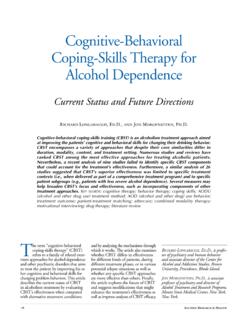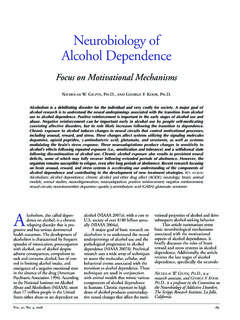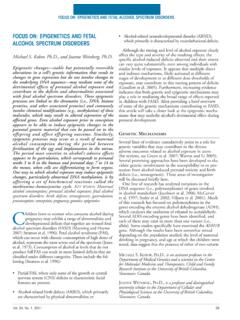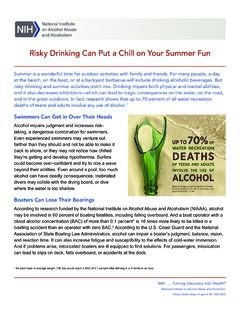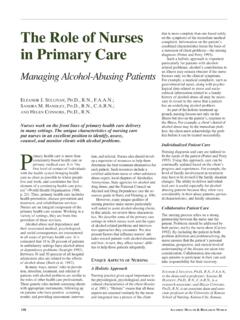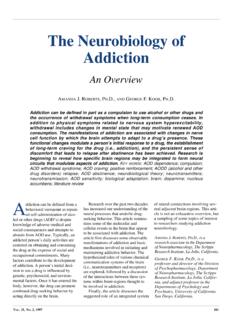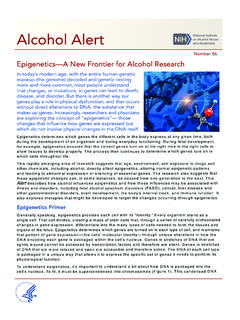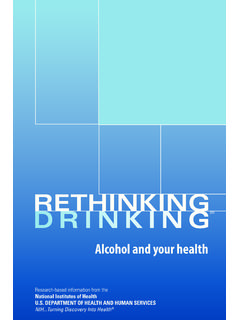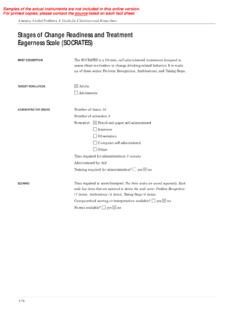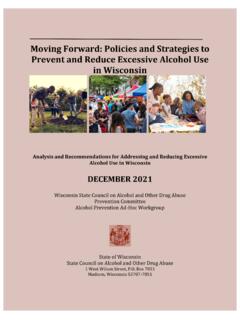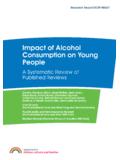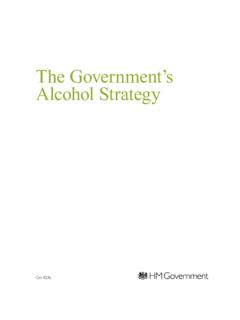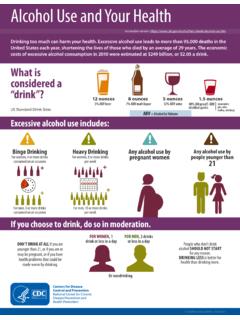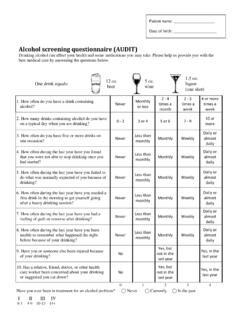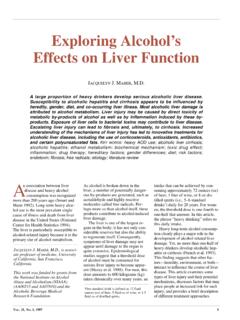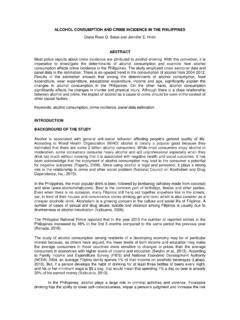Transcription of Alcohol and the Immune System - National Institutes of …
1 One of the least appreciated medical complica-tions of Alcohol abuse is its effect on the immunesystem. Excess Alcohol consumption may lead to Immune deficiency, causing increased suscep-tibility to certain diseases. Life-threateningcomplications of alcoholism such as liver diseaseand liver failure may have a component ofautoimmunity, in which the Immune systemturns on the body s own tissues. This sectiondescribes current research that is providing newinsights into the regulation of the Immune systemin people who drink Alcohol heavily by examiningalcohol-related alterations in the cells and mole-cules that shape the Immune response. It alsodescribes some of the exciting new techniquesthat are being designed to improve or restoreimmune function by manipulation of these cellsand molecules.
2 Although much remains to belearned, researchers are making rapid progress inunderstanding Alcohol -related Immune and Diseases Related to theImmune SystemPhysicians have long observed that excessivealcohol consumption can lead not only to liverdamage but also to increased illness and deathfrom infectious diseases such as pneumonia. (See, for example, the writings of Philadelphiaphysician Benjamin Rush [1745 1813] [Rush1943]). We now regard this increase in disease asthe result of immunodeficiency caused by alcoholabuse. Further, there is reason to suspect that theorgan damage, such as alcoholic liver disease,observed in people who drink Alcohol heavily is at least partially caused by Alcohol -triggeredautoimmunity in which the Immune systemattacks the body s own tissues.
3 A number ofreviews in the literature provide an overview ofcurrent knowledge concerning Alcohol s effects onthe human Immune System (Baker and Jerrells1993; Cook 1995, 1998; Frank and Raicht 1985;Ishak et al. 1991; Johnson and Williams 1986;Kanagasundaram and Leevy 1981; MacGregorand Louria 1997; Mendenhall et al. 1984; Muftiet al. 1989; Palmer 1989; Paronetto 1993;Watson et al. 1986).Diseases Related to ImmunodeficiencyPneumoniaIn the early part of this century, researchers notedthat alcoholics were more than twice as likely asnonalcoholics to die from pneumonia (Capps and Coleman 1923). Despite the availability ofantibiotics in the modern era, Alcohol abusers stillsuffer from increased susceptibility to bacterialpneumonia (Chen et al.)
4 1992; Chomet and Gach1967; Cortese et al. 1992; Esposito 1984; Kuikkaet al. 1992; Kuo et al. 1991). Further, a study of all patients with pneumonia has shown that a high percentage were Alcohol abusers, eventhough they may not have been diagnosedpreviously as alcoholics (MacGregor and Louria1997). Clearly, the effects of Alcohol abuse onillness rates and treatment costs for pneumoniaare incidence and severity of pulmonary tuber-culosis (TB) is greater in alcoholics than innonalcoholics (MacGregor and Louria 1997). In the overall population, 16 percent of TBpatients are Alcohol abusers; the percentage rangesup to more than 35 percent in some populations(Centers for Disease Control and Prevention[CDC] 1996).
5 For example, long-term studies of drug and Alcohol abusers who were followedfor many years showed that these individuals hadTB incidence rates from 15 to 200 times the ratesfor control populations (Friedman et al. 1987,1996). In recent years, the incidence of TB has been increased by the presence of humanimmunodeficiency virus (HIV) in drug andalcohol abusers. However, even after this addedrisk is taken into account, it is still clear that drugand Alcohol abusers have increased rates of illnessand death from TB (CDC 1996; White and214 Chapter 4: Medical Consequences Alcohol and the Immune SystemPortillo 1996). The recent rise of drug-resistantstrains of the TB bacillus (CDC 1996) gives evengreater urgency to the need for effective inter-vention among populations at risk of TB, bothnationally and Infection with HIV, which leads in its later stagesto acquired immunodeficiency syndrome (AIDS),has become one of the great epidemics of ourtime, with millions infected worldwide.
6 Trans-mission is primarily through sexual contact or thesharing of used needles by drug abusers. Alcoholabusers may be at increased risk for infection dueto risky sex practices compared with nonabusers(MacGregor and Louria 1997), but two questionsremain unanswered. The first question is whetheralcohol consumption, either before or at the timeof exposure, increases susceptibility to second question is whether Alcohol usehastens the progression from asymptomatic HIVinfection to full-blown AIDS. Studies of alcoholeffects on HIV using isolated white blood cellshave produced conflicting results. One researchgroup reported an increased HIV growth rateafter prior Alcohol consumption by donors of thecells (Bagasra et al.)
7 1989, 1993, 1996). A secondgroup found no consistent effect (Cook et ). A recent clinical study of HIV-positivedrug abusers who were followed for several yearsshowed that those who drank Alcohol heavily had significantly more abnormalities in the T-lymphocytes (T-cells; see the discussion in this section on the Immune System ) than did those who were light Alcohol drinkers orabstainers (Crum et al. 1996). Since both HIV-infected individuals and noninfected alcoholabusers have compromised Immune systems, the question of interactions between these twoconditions remains important for C and Hepatitis B Many recent studies have attempted to determinethe relationship between Alcohol abuse andhepatitis C virus (HCV) or hepatitis B virus(HBV) infection.
8 The most recent studies havedetermined that, after correction for nonalcohol-related risk factors such as intravenous drug abuseand unsafe sexual practices, alcoholics do not havean increased incidence of HBV but do have anincreased HCV incidence of about 10 percentcompared with nonalcoholics (Rosman et ). If alcoholics are considered as a groupwithout excluding other risk factors for infection,the prevalence of either HBV or HCV is in therange of 10 to 50 percent (French 1996; Grellierand Dusheiko 1997; Rosman et al. 1996). Thesehepatitis-positive patients are suffering from twodiseases, alcoholism and nonalcoholic viralhepatitis, that may have additive or synergisticeffects on the development of liver disease.
9 Both conditions may affect the Immune System to produce immunodeficiency and Infections Alcohol abusers are more susceptible than non-abusers to other infections, such as septicemia,which is an infections of the circulating blood. In some cases, septicemia is caused by bacterialspread from pneumonia. Other infections thatmay lead to septicemia in the Alcohol abuserinclude urinary tract infections and bacterialperitonitis, an infection of the lining of theabdominal cavity (Chen et al. 1992; Cortese et al. 1992; Esposito 1984; Kuikka et al. 1992;Kuo et al. 1991).Alcoholics appear to be more susceptible thannonalcoholics to several less common infections,such as lung abscess, empyema (an accumulationof pus in the chest), spontaneous bacterialperitonitis, diphtheria, cellulitis (an inflammationof connective tissue), and meningitis (an inflam-mation of the membranes of the brain and spinalcord) (MacGregor and Louria 1997).
10 It is clearthat the increased incidence of infectious diseasesin Alcohol abusers represents a significant toll ofindividual suffering and of medical expense Related to AutoimmunityA disastrous medical complication of chronicalcohol abuse is alcoholic liver disease witheventual liver failure. Alcoholic liver disease, Alcohol and the Immune System215which includes alcoholic hepatitis, cirrhosis, andfatty liver, is discussed in the section Alcohol -Induced Liver Injury earlier in this chapter andin the Ninth Special Report to the Congress onAlcohol and Health( National institute on AlcoholAbuse and Alcoholism 1997). Several extensivereviews present an overview of published research(Lieber 1994; Mendenhall et al.)
